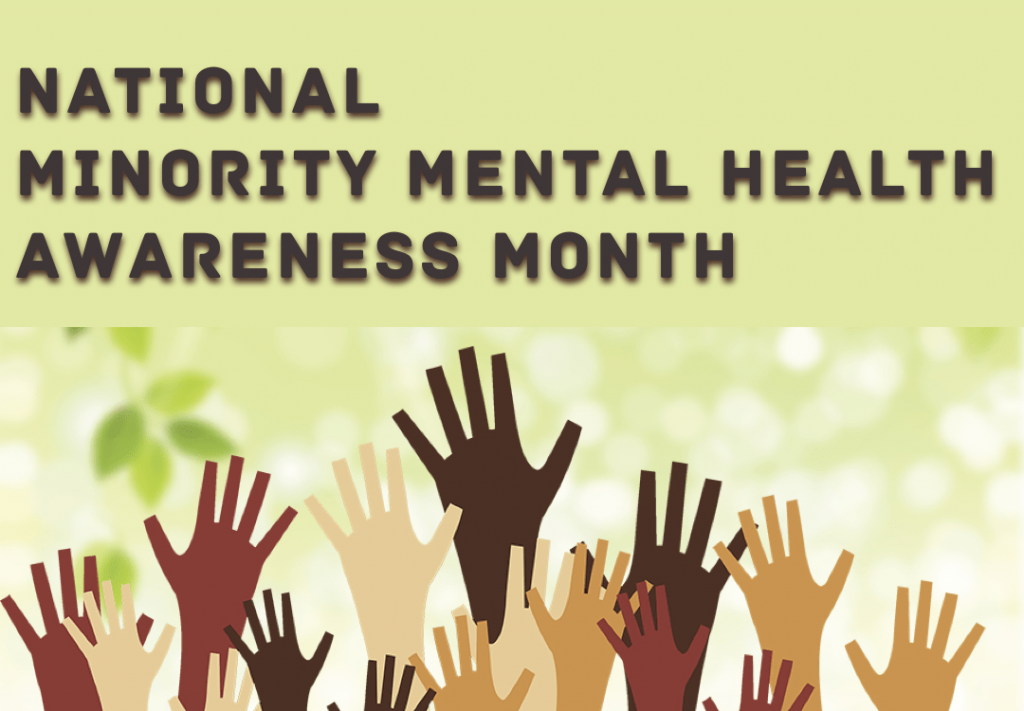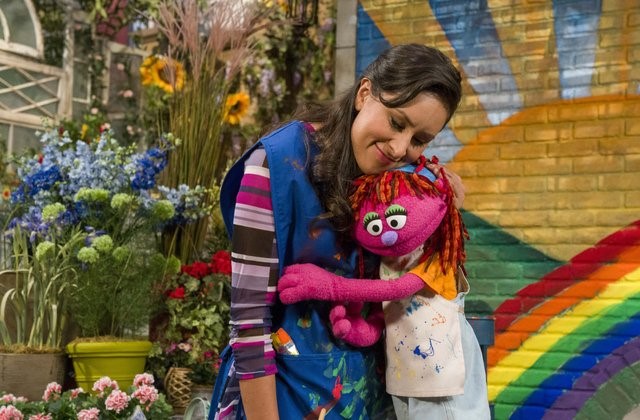National Minority Mental Health Awareness Month

Shine’s Guide to Minority Mental Health Month
July 1, 2019
Mental health issues don’t discriminate.
Regardless of who you love, what you look like, what you believe, or how much money you have in the bank—mental illness may affect you. In fact, it impacts up to 46.6 million adults in America, according to data by the National Institute of Mental Health. That’s nearly one in five adults.
But while mental health issues affect all people, we need to talk about how coping and receiving care is a much different story.
The truth is, people from minority groups are less likely to receive mental health carethan others. Research from the American Psychiatric Association (APA) shows that in 2015, for example, 48% of white adults living with mental illness received mental health services, compared with 31% of Black and Hispanic adults, and 22% of Asian adults.
The truth is, people from minority groups are less likely to
receive mental health care than others.
There are two main reasons for this gap: Inaccessibility to high-quality care and cultural stigma surrounding mental illness within minority groups, according to the APA.
No one understood that better than African American author, journalist, and advocate Bebe Moore Campbell. At the turn of the century, she led the charge to destigmatize the conversation surrounding mental health in underrepresented communities. In 2005, Campbell and her friend Linda Wharton-Boyd began laying the groundwork for what would eventually become a nationally recognized Minority Mental Health Awareness Month; however, due to an illness, Campbell was unable to see it through to legislation. She passed away in 2006.
Which is why a few years later, July was designated as Bebe Moore Campbell National Minority Mental Health Awareness Month, in her honor. It was instituted in 2008 to highlight the unique struggles that underrepresented groups face when it comes to mental illness in the United States, and also to help improve awareness and access to mental health treatment.
Since then, Mental Health America has worked to expand the term “minority” to be more inclusive outside of solely race, ethnicity, and culture. Minority Mental Health Month now encompasses a wide range of marginalized and underserved communities, including those who may identify as part of the LGBTQIA+ community, refugee and immigrant groups, religious groups, and others who are often overlooked.
Here at Shine, we believe in the impact of honoring intersectionality, especially as it pertains to how people practice self-care. To complement our Mental Health Days Guide, we’ve put together this guide to dive deeper into the nuances of navigating mental health as a member of an underrepresented group. Let’s get started!
How to know when it’s time to get help.
There’s a wide range of mental health conditions, and pinpointing whether or not you’re experiencing one or more can be tough—especially since it’s easy to fall down a WebMD rabbit hole.
An expert can help you pinpoint exactly which mental illness you might be dealing with, but what’s most important is knowing when to seek help in the first place.
So, when is it time to acknowledge that you’re feeling more than the normal sense of stress and tiredness?
Typically, the best time to dive deeper into your mental health is when these feelings become excessive and disruptive to your day-to-day. The National Alliance of Mental Illness (NAMI) outlines many of the common warning signs of mental illness—here are just a few:
●︎ Excessive worrying or fear
●︎ Feeling excessively sad or low
●︎ Extreme mood changes, including uncontrollable “highs” or feelings of euphoria
●︎ Prolonged or strong feelings of irritability or anger
●︎ Avoiding friends and social activities
●︎ Inability to carry out daily activities or handle daily problems and stress
If you’re experiencing any of these symptoms, there’s a silver lining: with treatment your mental health can improve. But it all hinges on your ability to ask for help and openness to receiving it.
Seeking help is the first step in ensuring your wellbeing—and
it’s a sign of strength, not weakness.
Seeking help is the first step in ensuring your wellbeing—and it’s a sign of strength, not weakness. “Being strong also means knowing when to ask for support and accepting support when it’s offered,” Nedra Tawwab, M.S.W., L.C.S.W., tells Shine.
How to build a connection—and trust—with a therapist.
Now that you’ve realized you want support, it’s time to lean all the way into trust. For many members of minority groups, that’s not always easy.
There’s a level of distrust for medical professionals, and it’s not without reason: According to the APA, there’s a well-documented history of “unethical treatment of ethnic minorities in research and practice.” Combined with spiritual, religious, or cultural stigmas surrounding mental illness—it can make it tough to trust and embrace the systems of mental health support that are available.
Finding a professional who works for you and building what Psychology Today calls a “therapeutic alliance” is key. It’s when a therapist shows compassion and patience, all while developing a sincere connection with a patient. Many studies show that developing this alliance with your therapist is the number one predictor of success—it just may take a little work to find and cultivate.
A ‘therapeutic alliance’ is when a therapist shows compassion
and patience, all while developing a sincere connection with a patient.
If you’re feeling misunderstood by your therapist or seeing someone new for the first time, it’s important to tell them what you’re feeling, even if it feels vulnerable. Remember: It’s their job to listen and understand you.
During your session, be open about what helps you feel connected with them and what doesn’t. Try to be as detailed as you can about when you’ve felt that “therapeutic alliance” with them, and the times when you’ve felt misunderstood.
And if you don’t feel like you’re getting what you need from your therapist: Know it doesn’t necessarily mean that therapy isn’t for you. It just might mean that therapist isn’t quite right. Don’t be afraid to seek out another therapist that might be a better fit.
Finding a therapist who gets you.
For many people in minority groups, the preference is to be treated by a therapist or an expert of a similar background—yet that can sometimes be tricky to find, given the fact that there’s a shortage of minority mental health professionals. In some areas, they’re virtually non-existent.
A 2015 report from the APA indicates that 86% of psychologists in the U.S. workforce were white, 5% were Asian, 5% were Hispanic, 4% were Black and 1% were multiracial or from other racial/ethnic groups. The numbers show it’s a much less diverse field than the world we live in—especially considering the U.S. general population is 38% minority groups.
The most important first step? It’s to look at experience, Tawwab says. “The experience your therapist has is an important bit of information for knowing if someone is truly a good fit,” she tells Shine. “Schedule a consultation with a therapist to see if they understand your needs.”
For many people in minority groups, the preference is to be
treated by a therapist or expert of a similar background—yet that can sometimes
be tricky to find.
Before the initial call or in-person consultation: Have a look at their website to see if in their bio or specialties they mention having handled your particular minority group’s concerns, or if they’ve addressed any topics on diversity in their own work, blog posts, or social media.
During this consultation, know it’s OK to ask: Have you worked with someone in my minority group before? How often? What approach would you take in order for us to better connect?
Thanks to the power of the Internet, there are also now accessible databases to help you find mental health providers that specialize or belong to certain minority groups—and also navigate the financial barriers that so many of us face when trying to seek help.
“I think it’s incredibly important to have resources that are specific and tailored to minority communities so that people can feel seen and identify with the information presented,” Joy Harden Bradford, Ph.D., a psychologist and founder of Therapy for Black Girls tells Shine. “Having information tailored to them makes the unspeakable, speakable and if we can talk about, we can do something about it.”
Here are just a few:
Therapy for Black Girls Therapy for Black Girls is an online space committed to encouraging the mental wellness of black women and girls. It features a directory of therapists as well as a weekly podcast highlighting all things mental health for black women.
Latinx Therapy Latinx Therapy is a bilingual therapist directory and podcast working towards destigmatizing mental wellbeing in the Latinx community.
South Asian Mental Health Initiative & Network The South Asian Mental Health Initiative & Network is a non-profit that addresses the mental health needs of the South Asian community in the U.S. with education, resources, and services.
National Queer and Trans Therapists of Color Network The National Queer and Trans Therapists of Color Network works to increase direct access to queer and transgender mental health practitioners, provide resources rooted in social justice and liberation, as well as technical assistance for social justice organizations.
Asian American Psychological Association The Asian American Psychological Association is a community of Asian American psychologists and other mental health professionals who advocate on behalf of Asian Americans as well as advancing Asian American psychology.
Melanin & Mental Health Melanin & Mental Health connects individuals with culturally competent clinicians committed to serving the mental health needs of black & Latinx/Hispanic communities. They are committed to promoting the growth and healing of these communities through their online directory, podcast, free resources on their website, and monthly events.
Lighthouse Lighthouse is a database that connects people to the right LGBTQ+ friendly healthcare and wellness providers. Their practitioners are currently only based in NYC, but they are rapidly working to expand nationwide.
Open Path Collective Though not specifically for minorities Open Path, addresses one of the key issues most face when looking for mental health services: finances. Open Path is a collective of mental health professionals dedicated to providing in-office mental health care at an incredibly reduced price.
Talking about your mental health with loved ones.
A feeling of support can be one of the determining factors of whether or not a person seeks help. And within minority communities, it’s no secret that mental health can be seen as taboo.
Yet your mental health extends beyond the walls of a therapist or counselor’s office, so it’s important to feel comfortable having these conversations with those around you. It’s proven that opening up about your mental health journey can help alleviate stress and improve your mood.
Your mental health extends beyond the walls of a therapist or
counselor’s office, so it’s important to feel comfortable having these
conversations with those around you.
So, how do you open up? It’s all about collaborative treatment, Zeahlot Lopez, M.S., L.M.F.T., L.P.C.C, a licensed psychotherapist, tells Shine.
In her practice, Lopez sees a number of minority patients who’ve been in this situation. “What I always suggest is that they (advocate) for themselves but also keep respect for their family,” she says. “For example: ‘Mom I feel hurt when you say therapy (isn’t good) and it doesn’t work. I feel that it works for me, and I think it’s helping my mental health and helping me have a better relationship with you.’”
It’s also important to be as detailed as possible when speaking about the major impact your mental health has on your life.
For example, instead of saying “I’m always tired,” you can get more specific, like: “In the morning when I wake up—no matter how much sleep I’ve gotten—I can never seem to get out of bed. It’s physically difficult for me to move and find the motivation to start my day.”
Or: “It’s difficult for me to focus on everyday tasks because my mind is always going to what I may be doing wrong in other areas.”
And don’t be afraid to pull out the facts. Often, those who are weary of mental health conversations simply aren’t as educated about it. Explain to a loved one that mental illness is common (again: it affects one in five U.S. adults!) and that seeking treatment—rather than trying to overlook it—is the healthiest and smartest way to cope.
An analogy that might help: Just like you’d seek help for a physical ailment—like the flu or a broken bone—it’s necessary to get professional help for a mental illness, too.
Not sure how to start a conversation? Mental Health America offers a series of prompts and scripts to help you out.
Talking about your mental health with your boss.
Some bosses and supervisors may hold biased mindsets when it comes to mental health and minority groups, which can make it difficult to express when you’re struggling.
If you feel like you may not be taken seriously, you aren’t alone. But the important thing to do is to speak up for your needs, especially if your mental health impacts your day-to-day in the office.
“It’s OK to admit that you aren’t able to handle everything that comes your way,” Tawwab, who often helps her WoC clients overcome the ‘superwoman’ complex, says. “No one can handle everything, not even a strong Black woman. It’s important that Black women are aware of their limitations and that they become comfortable with asking for help.
“It’s OK to admit that you aren’t able to handle everything that comes your way. No one can handle everything, not even a strong Black woman.”
– Nedra Tawwab, M.S.W.
In our Complete Guide to Mental Health Days, we suggest talking to your boss or manager about your mental health in person. That way, you can get a better sense of their response. But it’s completely understandable if that feels too difficult. In our guide, we share templates of exactly what you can write in an email, too.
If your boss still isn’t receptive, try leaning on a co-worker you trust or an HR manager for help. Your wellbeing is what’s most important—and nothing will work if you don’t.
Building a mental health community.
Yes, social media can be a tricky space to navigate these days. However, it’s definitely possible to tailor the ‘gram and make it a more positive experience—especially since there’s a new guard of influencers and social accounts with powerful messages and perspectives on self-care.
Here are some you should hit that follow button on:
Sad Girls Club @sadgirlsclub: A WOC-driven mental health community
Black Girl In Om @blackgirlinom: A wellness community for women of color
Dior Vargas @dior_vargas: A queer Latina mental health activist
The Mental Health Spotlight @themhspotlight: A community working to change the dialogue about mental health in South Asian communities
Alex Elle @alex_elle: Affirmations and reflections on mental health and self-care
Nedra Glover Tawwab @nedratawwab: Therapist, writer, and relationship maven
Lalah Delia @lalahdelia: Spiritual writer and author
Donte Colley @donte.colley: Motivational dancer focusing on self-care and mental health
Gloria Lucas @nalgonapositivitypride: A Xicana body-positive and eating disorder awareness organization
Hannah Daisy @makedaisychains: Queer artist and mental health advocate
Mental health doesn’t discriminate—but it’s easy to be made to feel like your mental health doesn’t matter. Whether it’s because of cultural stigmas, the lack of support from your community or work environment, or the many barriers to treatment—it can feel tough to try and get help and easier to try and just “get by.”
For more information, please visit Shine’s website at https://advice.shinetext.com/articles/shines-guide-to-minority-mental-health-month/ (article location)




